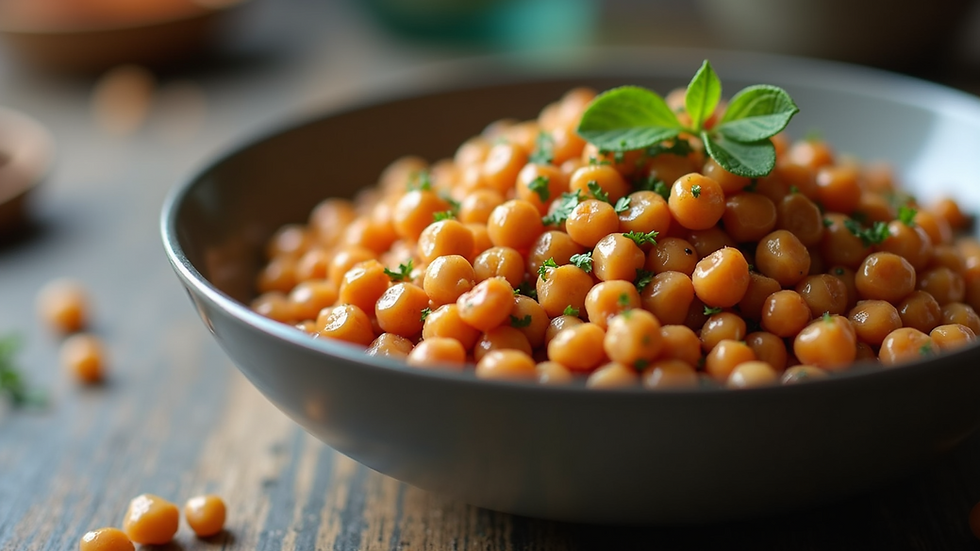How to Eat a High Protein Diet While on Weight Loss Medications
- Jennifer Killebrew

- Aug 5, 2025
- 4 min read
Navigating a high-protein diet while on weight loss medications can be a game changer in your weight loss journey. Weight loss medications function as a supportive tool, but they work best when complemented by a healthy, balanced diet. A high-protein diet not only aids in weight loss but also ensures that your body receives the necessary nutrients to function optimally. In this blog post, we will explore protein sources, daily protein targets, meal planning tips, the relationship between a high-protein diet and weight loss medications, and how to effectively count macros.
Understanding Protein and Its Importance
Protein is a crucial macronutrient that plays multiple roles in the body. It is essential for building and repairing tissues, producing hormones and enzymes, and supporting immune function. When you’re on weight loss medications, maintaining a high protein intake can help preserve lean muscle mass, which is important for metabolism. Additionally, protein helps keep you full longer, reducing the likelihood of overeating.
For individuals on weight loss medications, a high-protein diet can counteract some of the potential side effects of these medications, such as muscle loss or a drop in energy levels. Understanding how to effectively incorporate protein into your diet can make this journey smoother.
Recommended Protein Sources
When looking to increase your protein intake, it is important to choose high-quality sources. Here are several protein-rich foods to consider:
Lean Meats: Chicken breast, turkey, and lean cuts of beef and pork are excellent sources of protein.
Fish and Seafood: Salmon, tuna, and shrimp pack a protein punch, while also providing healthy omega-3 fatty acids.
Dairy Products: Greek yogurt, cottage cheese, and low-fat cheese are great dairy-based sources of protein.
Eggs: A versatile protein source, eggs can be cooked in various ways and are nutrient-dense.
Legumes: Beans, lentils, and chickpeas are not only high in protein but also rich in fiber, which aids digestion.
Nuts and Seeds: While calorie-dense, a small handful of almonds, chia seeds, or pumpkin seeds can provide a good protein boost.

Setting Your Daily Protein Targets
Determining how much protein you need daily while on weight loss medications can depend on several factors, including age, sex, activity level, and weight loss goals. A general guideline for adults aiming for weight loss is to consume about 0.8 to 1 gram of protein per pound of body weight.
For example, if you weigh 150 pounds, you should aim for 120-150 grams of protein per day. If you are very active, you may need even more to support muscle recovery. It can be helpful to spread your protein consumption throughout the day over three meals and two snacks to help with satiety and muscle retention.
Meal Planning Tips
Effective meal planning can ensure you meet your protein targets while keeping your meals enjoyable and nutritious. Here are a few tips to consider:
Plan Ahead: Dedicate time each week to plan your meals. Include a variety of protein sources to avoid monotony.
Prep Your Meals: Cook large batches of protein-rich foods, like grilled chicken or baked fish. Store them in the fridge to make quick meals throughout the week.
Incorporate Protein in Every Meal: Try to include at least one protein source in each meal and snack. For example, add Greek yogurt to your breakfast, have a protein shake post-workout, and ensure your dinners contain lean meats or legumes.
Use Protein Supplements if Necessary: If you're struggling to meet your protein goals through food alone, consider using protein powders or bars. They can be an easy addition to smoothies or oatmeal.

How a High-Protein Diet Supports Weight Loss Medications
A well-balanced high-protein diet can enhance the effectiveness of weight loss medications. Here’s how:
Increased Satiety: High-protein foods can help you feel full longer, reducing calorie intake and helping you adhere to your weight loss goals.
Muscle Preservation: When losing weight, it is common to lose muscle mass along with fat. A high-protein diet helps minimize muscle loss, maintaining your metabolism.
Improved Metabolic Rate: Protein has a high thermic effect compared to fats and carbohydrates, meaning your body burns more calories digesting it. This can help enhance the fat-burning effects of weight loss medications.
It is essential to work closely with your healthcare provider to monitor your progress and adjust your meal plan as needed.
Counting Macros Effectively
Understanding how to count macros can empower you to make informed dietary choices. Here are some steps to help you track your protein intake:
Use a Food Tracking App: Download an app that allows you to log your meals. This can help you easily calculate the protein content of various foods.
Read Nutrition Labels: Familiarize yourself with reading nutrition labels, as they provide information on protein content per serving.
Weigh Your Food: To ensure accuracy in your macro-counting, consider weighing your food. It may help you gauge your intake more precisely.
Adjust Based on Feedback: Track your progress and adjust your protein intake based on how your body responds. If you're not feeling satisfied, consider increasing your protein amount in meals.

Embracing a High-Protein Lifestyle
Incorporating a high-protein diet while on weight loss medications can be straightforward with a little planning and commitment. Focus on quality protein sources, monitor your intake, and embrace meal prep to streamline your daily eating habits. Remember to consult with your healthcare provider to tailor your dietary approach based on your individual health needs and medication effects.
By prioritizing protein, you pave the way for long-term success, ensuring the effectiveness of your weight loss medications and setting the foundation for a healthier lifestyle. Whether you're cooking with lean meats, enjoying a protein smoothie, or snacking on Greek yogurt, making mindful choices can enhance your weight loss journey significantly.
As you navigate this journey, remind yourself: consistency is key. Stick to your high-protein diet, monitor your progress, and make adjustments as needed. Your body will thank you as you feel more energized, satisfied, and empowered in your weight loss efforts. Let your high-protein approach be a vital component of not only your medication plan but a new way of living that supports your health and wellness goals long-term.

.png)




Comments